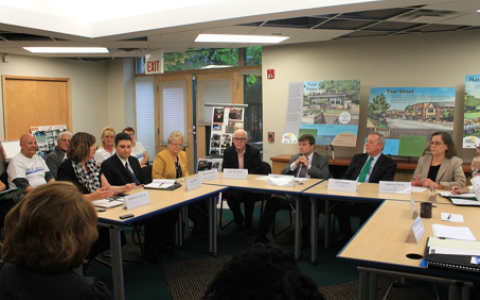Quigley, Durbin Hear from Victims of Urban Flooding
Discuss their bicameral Urban Flooding Awareness Act of 2015
CHICAGO – Today, U.S. Representative Mike Quigley (IL-05) and U.S. Senator Dick Durbin (D-IL) met at the Center for Neighborhood Technology (CNT) with Chicago residents whose homes or businesses have flooded as a result of urban flooding and discussed their bicameral Urban Flooding Awareness Act. Their legislation is designed to address increased flooding in urban communities and to find solutions for the urban communities impacted.
"It is clear from the stories Senator Durbin and I heard today that urban flooding is impacting homeowners and businesses across the Chicago region," said Rep. Quigley. "As we experience more severe storms, this problem will only continue to grow. We need real information to understand the pervasiveness of urban flooding so we can find solutions not just in Chicago, but across the country. I appreciate all of the work being done at CNT, by MWRD, and at IDNR to help address urban flooding. Moving forward, I will continue to work with Senator Durbin and my colleagues in D.C. to bring greater attention to this issue, and do all we can to move the Urban Flooding Awareness Act forward in Congress."
"For many homes in urban areas, just a few inches of rain can cause thousands of dollars in damages," said Senator Durbin. "The truth of the matter is, we don't have very much data on frequency, severity, or how we might better prepare for the kind of weather that turns into flooded streets, businesses and homes. The legislation Representative Quigley and I introduced earlier this year will remedy that by helping experts understand the scope of the problem and develop solutions. With the frequency and severity of storms growing year by year, we need to gain a better understanding of flooding in our cities."
"The implications of the research for disaster preparedness across the nation are enormous," said Kathryn Tholin, CEO of the non-profit CNT. "We have for decades been spending billions of taxpayer dollars to solve only one part of the flood damage problem. With this new information, we can invest our resources in a way that protects a much larger group of flood victims."
Along with those who have been affected by urban flooding, the discussion was attended by Kathryn Tholin, CEO of the Center for Neighborhood Technology; Mick Cosme and Joe Kratzer, Storm Water Managers for Metropolitan Water Reclamation District (MWRD); and Brian Eber, Northeast Illinois Floodplain Program Coordinator for Illinois Department of Natural Resources (IDNR).

Kathryn Tholin of CNT, Senator Durbin and Rep. Quigley (from right to left) listen to firsthand accounts of urban flooding from Chicago residents and small business owners.
Rep. Quigley and Sen. Durbin's bill creates, for the first time, a federal definition of urban flooding and requires the Federal Emergency Management Agency (FEMA), in coordination with related Federal agencies, to conduct a nationwide study of urban flooding and flood damage. The goal is to analyze existing storm water management programs and craft policies and strategies to encourage the design and use of the best possible flood prevention practices, with a focus on rapid, low-cost approaches. This study would be the first of its kind to comprehensively analyze both individual and societal costs associated with urban flooding across the country.
Most coastal and riverine communities are clearly defined and included in flood maps. However, many urban communities experience severe, repeated and increasing damage from flooding unrelated to any surface body of water. Current federal flood management programs do not directly address this type of flooding and its consequences. Just a few inches of rain can cause thousands of dollars in damage for both home and small business owners. Around 20-25 percent of all economic losses resulting from flooding occur in areas not designated as being in a "floodplain," but as a consequence of urban drainage," according to FEMA. A recent study of urban flooding in Illinois by the State Department of Natural Resources found that more than 92 percent of the flood damage claims reviewed were outside any floodplain, wet basements from flooding events are cited among the top reasons for not purchasing a home, and industry experts estimate flooding can lower property values by 10-25 percent. Further, nearly 40 percent of small businesses do not reopen following a disaster according to FEMA.
The Urban Flooding Awareness Act has been endorsed by the National Association of Realtors and the Association of State Floodplain Managers.
With portions of Illinois' 5th Congressional District devastated by flooding three times in the past seven years, Rep. Quigley has been an outspoken advocate for the completion of flood control measures such as the McCook and Thornton Reservoirs. He has also actively called for revising the process of awarding federal aid to disaster-afflicted communities. In 2013, Rep. Quigley and Sen. Durbin secured $29 million in federal grants to help the Chicagoland area and the state of Illinois recover from spring flooding.